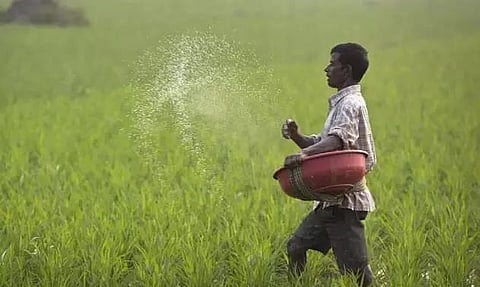
- Home
- Live Blog
- Breaking News
- Top Headlines
- Cities
- NE News
- Sentinel Media
- Sports
- Education
- Jobs

The Central Government's decision to hike Minimum Support Prices (MSP) for paddy and other Kharif crops for 2022-23 is targeted to provide a cushion to farmers against the rising input and production costs. The government has announced a higher percentage of increase in MSPs for oilseeds, pulses and nutri-cereals compared to paddy, in a bid to encourage farmers to diversify into these crops to boost domestic production and reduce the import of edible oil and pulses. For Assam, farmers benefitting from MSP hikes will depend on improvement in the procurement system. The government has announced an increase in MSP for paddy by Rs 100 to Rs 2040 a quintal while a maximum MSP hike of Rs 523 a quintal has been announced for sesamum. The government estimates the cost of paddy production for the current fiscal at Rs 1360 for each quintal and takes a 50% return over the cost of production at Rs 680 a quintal to fix the MSP at Rs 2040 a quintal. The cost includes all paid-out costs such as those incurred on account of hired human labour, bullock labour/machine labour, rent paid for lease in the land, expenses incurred on use of material inputs like seeds, fertilizers, manures, irrigation charges, depreciation on implements and farm buildings, interest on working capital, diesel/electricity for the operation of pump sets etc., miscellaneous expenses and value of family labour. Prices of seeds, fertilizers, increase in irrigation charges on account of hike in diesel price, electricity tariff, and machine labour remaining stable will be critical to new MSP for paddy providing the farmers with the intended benefits and a shield against distress selling for non-remunerative prices. An official release states that the return over MSP for bajra, tur, urad, sunflower seed, soybean and groundnut is more than 50 per cent over the All-India weighted average Cost of Production at 85%, 60%, 59%, 56%, 53% and 51% respectively. Concerted efforts have been made over the last few years to realign the MSP in favour of oilseeds, pulses and coarse cereals to encourage farmers to shift larger areas under these crops and adopt the best technologies and farm practices, to correct the demand-supply imbalance, it adds. According to National Food Security Mission (NFSM), the "yellow revolution" helped the country attain self-sufficiency in oilseeds production during the early 1990s, but it could not be sustained as the demand-supply gap requires the country to depend on huge imports to the tune of 60% of the total requirement. The total vegetable oil requirement in the country in 2022 has been estimated to be 33.20 million tonnes assuming a per capita consumption of more than 22 kg per person per annum. The anticipated vegetable oil production from 45.64 million tonnes of oilseeds in the year 2022 is 13.69 million tonnes, according to the NFSM Status Paper on oilseed crops and vegetable oil production in India. Official data show that from 2020-to 21 the country imported 13.35 million tonnes of edible oil of which palm oil accounted for 56% of the import volume. Apart from disrupting supplies, the ongoing Russia-Ukraine conflict has triggered a hike in the prices of edible oil which increased India's import bill and has prompted the Central Government to realign the MSP in favour of oilseeds and pulses. It remains to be seen if paddy farmers will be attracted by higher MSP on these crops due to factors like suitability of lands long used in paddy cultivation and expertise in growing paddy. The estimated demand for pulses is projected to increase from 26.72 million tonnes in 2021-22 to 32.64 million tonnes in 2029-30 against which estimated production in 2021-22 was 26.96 million tonnes, the increase in MSP is expected to help sustain the production to meet the growing and projected demand. The share of pulses to total food grain production decreased from 16.55% in 1950-51 to the current share of 6 to 7 per cent which indicates the potential for increasing pulses production in the country to boost farmers' income. The country is the largest producer of pulses accounting for 25% of the total production in the world but consumption is 27% which requires it to import pulses. Boosting domestic production with MSP support will augment farmers' income and will also protect consumers from international price volatility. Assam presents a paradoxical situation when it comes to food grain production and MSP. When it comes to paddy procurement at MSP, only 38,444 farmers in the state benefitted in the Kharif Marketing Season(KMS) 2021-22 while in Punjab, 10.57 lakh farmers benefited in KMS 2021-22 and 7.98 lakh farmers benefited in Rabi Marketing Season 2022-23. This explains the distressed selling by paddy growers in Assam which needs to be reversed by improving procurement. In respect of pulses, the state's production can meet only 14% of the total requirement. Higher MSP brings an opportunity for a sea change in Assam but will require strengthening of marketing and procurement system.